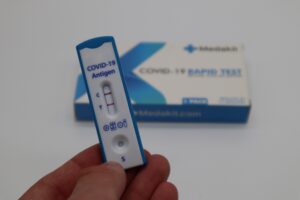While most people who get COVID-19 will recover within a few weeks, some may have symptoms for many weeks or months after the initial infection phase is over. The impact on mental health may be significant and psychologists can play an important role in recovery from long COVID.
What is long COVID?
Research suggests that 5-10% of people that test positive to COVID will go on to develop what’s referred to as long COVID or post-COVID conditions. This refers to a range of physical, psychological and neurological symptoms that have been found to persist for at least one month post onset, according to the Australian Department of Health, or three months post onset according to the World Health Organisation, and that can’t be explained by an alternative diagnosis. This condition is not well defined or understood, and it is a complex multisystem condition that is likely to have a spectrum of underlying pathology.
People experiencing long COVID most commonly report lingering symptoms such as tiredness or fatigue, breathlessness, muscle weakness, sleep difficulties, difficulty thinking or concentrating (sometimes referred to as “brain fog”), anxiety and depression. The number and severity of symptoms as well as the recovery rates tend to vary across individuals, and symptoms can have a significant impact on a person’s quality of life and ability to engage in regular activities such as work, exercise and family responsibilities.
Risk factors for long COVID

Long COVID is found more often in people who had severe COVID-19 illness, however anyone who has been infected with the virus can experience post-COVID conditions, even those who were asymptomatic or had mild illness.
Risk factors include being female, pre-existing asthma, older age, obesity, and having other health conditions. Prior mental health problems and having limited social supports has also been related to more severe psychological symptoms.
At this stage the most effective way to avoid long COVID is to prevent initial infection by staying up to date with vaccinations and boosters and using the standard COVID preventative practises.
Psychological symptoms of long COVID

Psychological difficulties are one of a range of symptoms which may be long-lasting. The most common mental health symptoms of long COVID include the following:
Psychological: anxiety and worry; depressed mood; post trauma symptoms.
Physical: poor sleep; fatigue; headaches; dizziness; muscle and joint pain; loss of taste and smell; exacerbation of any chronic health conditions such as pain.
Social: reduced social functioning; feeling stigmatised; difficulty accessing supports; impact on close relationships.
Cognitive: “brain fog” or reduced concentration, memory, attention, and processing speed.
Workplace: reduced functioning at work; financial stress.
Psychological support for long COVID
Psychologists can play a critical role in assisting those with long COVID to adapt to any long-term symptoms, and to navigate their recovery and uncertainty about their future.

Psychological support for long COVID may involve the following:
- Education, reassurance, and validation that long COVID is a recognized syndrome.
- Cognitive behavioural strategies to manage anxiety and low mood.
- ‘Pacing’ techniques to increase levels of activity in graded and systematic ways to avoid cycles of over-exertion followed by symptom flare up.
- Cognitive reappraisal to target unhelpful thoughts (e.g. feelings of inadequacy about being unable to work).
- Sleep hygiene techniques to target insomnia.
- Practical strategies to manage brain fog and memory loss.
- Mindfulness techniques to let go of worries about the future and improve present moment focus, as well as build acceptance for those struggling with the uncertainties of their situation.
- EMDR or cognitive processing therapy for those that have experienced trauma as part of their illness or treatment.
- Supporting families and caregivers.
- Connecting and linking up with appropriate peer supports (e.g. online groups).
Recovery from long covid needs to take a holistic, whole-person perspective, and psychologists are likely to be an integral resource in supporting those with long COVID.
To find out more about how the clinicians at MyLife Psychologists can help with long COVID please contact us.






